Online Dating and Relationships as Gen Zs
Online Dating and Relationships as Gen Zs
- by Prativa
Gen Zs have an online attention span of just 8 seconds. This short timeframe has transformed relationships into quick swipes from one dating app to another. The increasing prevalence of digital interaction has shifted relationships to the online realm, and the idea of an 'ideal' connection for the new generation has changed.
There's a noticeable communication gap with the older generation, and distinctions in the language of love, desire, and needs have led to a cultural shift towards radical individualism. This generation craves understanding and validation, prompting them to connect with like-minded individuals beyond the traditional circle through various online platforms. Moving away from settling for arranged family matches, Gen Z now seeks affection and partnership on personal terms, opening up a world of limitless possibilities.
In spite of this optimism of connecting with similar individuals on social media, dating for Gen Zs has become rather short-lived. It seems as if we have become particularly so practical when it comes to love and sex, that we aren’t able to build strong romantic relationships like our older peers would do. The juggle of exploring romantic and sexual identities without failing commitment to an urge for professional and financial stability has pushed us into more situationships than relationships. Even though we're more connected than ever, with a potential partner just a tap away, young people still feel lonely. It is the fine line between accessing mere sexual intimacy and sharing everyday mundane with someone that has enabled modern-day dating to lead haywire.
With more open interpretations of what relationship looks like on personal levels, the rising generation of today stands conflicted in a non-traditional find for connection. However, we have been so accustomed to seeking any spark within a limited span of texts and exchange of pictures, that it often influences the connection we become able to build. Today, every dating profile has become a tailor-made consumer product, with every match a transaction of validation, and each hookup a way to cope, forget and remind ourselves what it feels like to be held in conditions we are desperate to have control over. Sex has become a momentary experience to manufacture a connection until it no longer feels like shared intimacy. However, having shorter expiration dates for these, connections brought together by online apps is not a whole part of the problem. It becomes one when these connections penetrate like anti-climatic episodes in our everyday lifestyle.
Online dating has pushed us to seek rapid and intense gratification such as sexual contact rather than savouring something long-term that would possibly yield a stable relationship. Oftentimes, chasing ‘ the one ’ as portrayed by films and media has left us more lost than being found. Because of this, individuals who would seek a deeper connection, also deviate into casual intimacy for it diversifies the sense of options one would have. The idea that intimate partnerships are meant to have a linear structure with the goal of hitting conventional relationship milestones, such as living together, engagement and marriage has evolved for the Gen Zs. But given the temptation of this evolution, can we as the new generation be able to build the desired relationship for a term longer than our span of attention?
